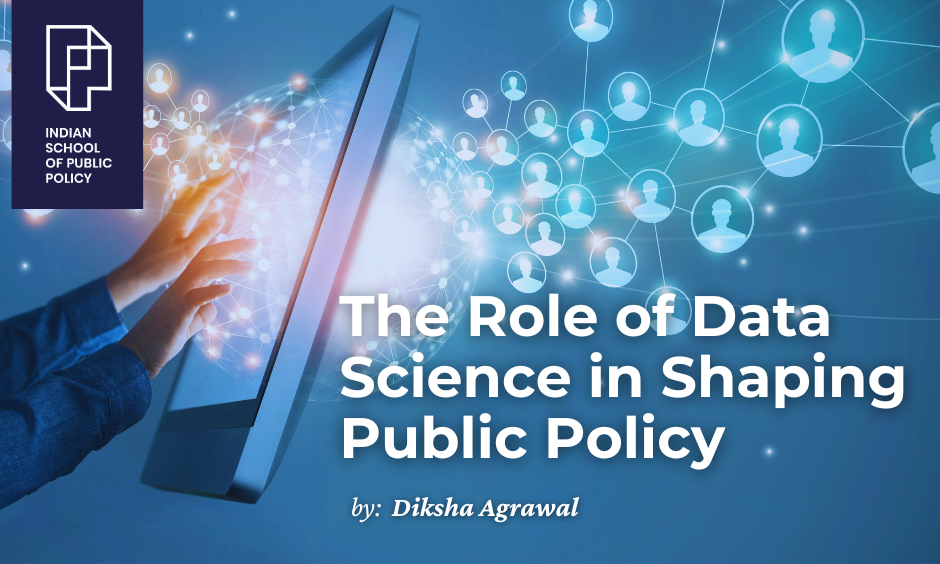
The Role of Data Science in Shaping Public Policy

Exploring the increasing importance of data analysis in policy research and decision-making
I recently came across an interview with Ken Steif, author of “Public Policy Analytics: Code and Context for Data Science in Government,” where he discusses the use of data and algorithms by governments and policymakers to address complex service delivery challenges. What intrigued me was his distinction between algorithms’ role in business settings and government contexts. Data Science is centred on leveraging data driven insights for decision making and service delivery, but its implementation in government diverges significantly from its use in business environments. Unlike in business, where algorithms primarily focus on financial goals, in government, they must consider a multitude of factors such as equity, politics, and bureaucracy. Ken emphasises the importance of empathy in algorithm development, underscoring the human-centred approach necessary in policy-making. Understanding the lived experiences of diverse communities is crucial for crafting effective and equitable solutions.
He emphasises the pivotal role of data science in tackling various service delivery challenges, which was particularly evident during the pandemic. From testing and PPE to vaccine distribution, governments globally faced hurdles in ensuring the alignment of limited supplies with demand—a trend mirrored in disaster response and essential service provision. The efficacy of data science in addressing these hurdles depends on governments’ proactive engagement with service delivery and logistics. Without this proactive mindset, data risks being relegated to a mere distraction rather than a potent tool for advancing public welfare.
Let us look in more detail at the importance of the use of data science in public policy:
- PREDICTIVE MODELLING aids in proactive response to challenges: Data Science facilitates predictive modelling and scenario planning, allowing policymakers to anticipate future trends, challenges and opportunities. Predictive Modelling helps authorities make informed decisions and tackle challenges proactively. For e.g. governments using data analytics can monitor environmental shifts, assess policy effectiveness and develop sustainable strategies. Predictive modelling enables authorities to anticipate environmental issues, facilitating early intervention and conservation initiatives. This data-centric approach ensures that environmental policies are aligned with practical requirements, promoting resilience and ecological sustainability for the future. In healthcare, predictive analytics can be utilised to forecast disease outbreaks based on patterns in patient data. Public health agencies can allocate resources more effectively by identifying potential hotspots, implementing targeted interventions and mitigating the spread of infectious diseases. In urban planning, predictive modelling can help city officials anticipate traffic congestion and plan infrastructure upgrades accordingly. By analysing historical traffic data, population trends and planned construction projects, authorities can optimise transportation networks, reducing commute times and enhancing overall urban mobility.
- Reduces Bias in Decision Making: Data science in public policy fosters evidence-based decision-making, leading to more objective governance and reduced bias. By leveraging objective data, governments can formulate policies that are better aligned with the genuine needs of the population, thus promoting sustainability and increasing the likelihood of policy success.
- Resource Allocation and Optimisation: By analysing population demographics, socioeconomic indicators, and service utilisation patterns, policymakers can pinpoint areas of need and prioritise interventions using data-driven insights. Data science empowers policymakers to optimise resource allocation by forecasting future demand, customising interventions to address the diverse needs of various population groups, and continually evaluating the effectiveness of resource allocation strategies. This data-driven approach to resource allocation fosters a fairer distribution of resources, enhances policy outcomes, and ultimately improves social welfare.
- Monitoring and Evaluation: Leveraging data science enables monitoring key performance indicators and data analysis, facilitating adjustments as necessary to ensure resources are utilised efficiently and effectively.
REAL-WORLD APPLICATIONS:
Let’s delve into real-world applications of data science in public policy, starting with India’s Aadhaar programme. With over a billion registered individuals, Aadhaar stands as the world’s largest biometric identification system. Through adept employment of data science, India has streamlined the management and analysis of vast datasets collected, thereby enhancing the efficient delivery of government services to its citizens. A notable example is the public distribution system, which aims to provide subsidised food grains to economically disadvantaged groups. Historically, the PDS faced challenges such as pilferage, duplicate beneficiaries and inefficient distribution. By integrating Aadhaar, these issues have been addressed through creation of a unique beneficiary database, implementation of Direct Benefit Transfers, Aadhaar enabled Point of Sale devices for biometric authentication. This has led to significant reductions in leakages, enhanced efficiency and better access for genuine beneficiaries. Aadhaar has played a pivotal role in ensuring that public policies are implemented accurately and effectively enhancing the overall impact of welfare programmes.
Predictive modelling significantly enhances the overall urban experience, particularly in traffic management and public transportation. For example, cities like Pune, Bengaluru, and Delhi leverage this technology to address traffic congestion. Pune Smart City Development Corporation Limited (PSCDCL) uses data analytics and predictive modelling to track traffic patterns and fine-tune traffic signal timings for smoother traffic flow. In the realm of public transportation, predictive models are instrumental in optimising bus routes and schedules in cities such as Mumbai and Hyderabad. By examining passenger flow data and travel behaviours, these models facilitate the design of more efficient and dependable public transit systems.
Register your Interest to Study at ISPP
Australia utilises sophisticated data science methodologies coupled with geospatial analysis to combat bushfires. Emergency services can accurately predict fire incidents by amalgamating weather data, terrain characteristics, and historical fire behaviour. Such predictive capabilities empower authorities to issue timely alerts and optimise firefighting operations, ultimately mitigating property loss and safeguarding lives during wildfire seasons.
These diverse examples underscore the pivotal role of data science in shaping effective public policy and enhancing societal well-being across the globe. From keeping streets safe to battling nature’s fury, it’s all about using the power of data to make the world a little brighter.
Although data science offers numerous advantages, it also presents various challenges. Privacy and cybersecurity concerns are paramount, compounded by the existing digital divide within society. Therefore, it is imperative for governments to take proactive measures to address these issues, bridging the digital gap and implementing robust frameworks for data protection.
Infographic

Diksha Agrawal
Programme Advisor – Admissions
Diksha Agrawal, a Sociology graduate from Miranda House and postgraduate from Delhi School of Economics, embarked on her professional journey as a research fellow for Prashant Kishore’s Jan Suraaj initiative. Travelling across various districts of Bihar, she gained profound insights into the diverse needs of communities, igniting a deep interest in the field of public policy.
Furthering her engagement in politics and governance, Diksha served as a consultant for Inclusive Minds, political consultancy working for Indian National Congress during the Chhattisgarh elections. This role provided her with invaluable insights into the socio-political landscape of the state, reinforcing her determination to drive positive change through effective policy formulation and implementation.







